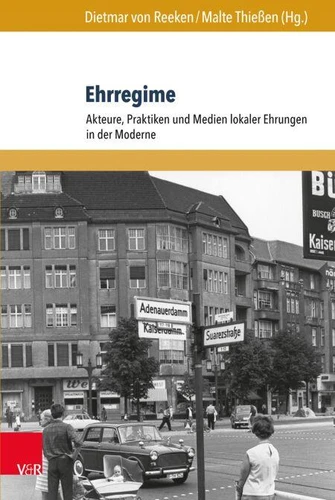Ehrregime. Akteure, Praktiken und Medien lokaler Ehrungen in der Moderne
Par : , , , ,Formats :
Disponible dans votre compte client Decitre ou Furet du Nord dès validation de votre commande. Le format PDF est :
- Compatible avec une lecture sur My Vivlio (smartphone, tablette, ordinateur)
- Compatible avec une lecture sur liseuses Vivlio
- Pour les liseuses autres que Vivlio, vous devez utiliser le logiciel Adobe Digital Edition. Non compatible avec la lecture sur les liseuses Kindle, Remarkable et Sony
 , qui est-ce ?
, qui est-ce ?Notre partenaire de plateforme de lecture numérique où vous retrouverez l'ensemble de vos ebooks gratuitement
Pour en savoir plus sur nos ebooks, consultez notre aide en ligne ici
- Nombre de pages350
- FormatPDF
- ISBN978-3-8470-0578-0
- EAN9783847005780
- Date de parution12/09/2016
- Protection num.pas de protection
- Taille9 Mo
- Infos supplémentairespdf
- ÉditeurV&R Unipress
Résumé
Ehrungen sind ein gesellschaftliches Problem: Seit Jahren brechen in Deutschland Debatten über Straßennamen und Ehrenbürger auf, stehen koloniale, nationalsozialistische oder militärische Traditionen in der Kritik. Der Sammelband greift diese Debatten auf, um der Geschichte von Ehrungen in deutschen und europäischen Städten im 19. und 20. Jahrhundert nachzuspüren. Im Fokus stehen Auseinandersetzungen um die Benennung von Straßen und Gebäuden, beim Errichten von Denkmälern, bei der Verleihung von Ehrenbürgerschaften oder bei der Widmung von Briefmarken.
Damit geht es um Zusammenhänge zwischen Ehrungen, sozialen Normen und Ordnungen, zwischen Räumen, Objekten und Identitäten und um die grundlegende Frage, was Ehrungen über den Wandel moderner Gesellschaften aussagen. Honouring people is a controversial issue today. Street names, honorary citizenships or memorials for politicians, military brass or scientists fuels debates not only in Germany, but in many European countries.
Politicians or the public criticize a problematic persistence of colonial, fascist or militaristic traditions and raise questions about local traditions. The book takes these debates as a starting point to shed light on the history of practices of honouring in German and European cities and regions in the 19th and 20th century. The authors focus on concepts and practices of honouring such as naming streets or public buildings after prominent citizens, erecting memorials, conferring medals, honorary citizenships, or issuing stamps.
The book opens up new perspectives on the relationship between honour, urban and regional identity, the connection between honour, spatiality, and social norms, or in short: on the transformation of local societies in the 19th and 20th century.
Damit geht es um Zusammenhänge zwischen Ehrungen, sozialen Normen und Ordnungen, zwischen Räumen, Objekten und Identitäten und um die grundlegende Frage, was Ehrungen über den Wandel moderner Gesellschaften aussagen. Honouring people is a controversial issue today. Street names, honorary citizenships or memorials for politicians, military brass or scientists fuels debates not only in Germany, but in many European countries.
Politicians or the public criticize a problematic persistence of colonial, fascist or militaristic traditions and raise questions about local traditions. The book takes these debates as a starting point to shed light on the history of practices of honouring in German and European cities and regions in the 19th and 20th century. The authors focus on concepts and practices of honouring such as naming streets or public buildings after prominent citizens, erecting memorials, conferring medals, honorary citizenships, or issuing stamps.
The book opens up new perspectives on the relationship between honour, urban and regional identity, the connection between honour, spatiality, and social norms, or in short: on the transformation of local societies in the 19th and 20th century.
Ehrungen sind ein gesellschaftliches Problem: Seit Jahren brechen in Deutschland Debatten über Straßennamen und Ehrenbürger auf, stehen koloniale, nationalsozialistische oder militärische Traditionen in der Kritik. Der Sammelband greift diese Debatten auf, um der Geschichte von Ehrungen in deutschen und europäischen Städten im 19. und 20. Jahrhundert nachzuspüren. Im Fokus stehen Auseinandersetzungen um die Benennung von Straßen und Gebäuden, beim Errichten von Denkmälern, bei der Verleihung von Ehrenbürgerschaften oder bei der Widmung von Briefmarken.
Damit geht es um Zusammenhänge zwischen Ehrungen, sozialen Normen und Ordnungen, zwischen Räumen, Objekten und Identitäten und um die grundlegende Frage, was Ehrungen über den Wandel moderner Gesellschaften aussagen. Honouring people is a controversial issue today. Street names, honorary citizenships or memorials for politicians, military brass or scientists fuels debates not only in Germany, but in many European countries.
Politicians or the public criticize a problematic persistence of colonial, fascist or militaristic traditions and raise questions about local traditions. The book takes these debates as a starting point to shed light on the history of practices of honouring in German and European cities and regions in the 19th and 20th century. The authors focus on concepts and practices of honouring such as naming streets or public buildings after prominent citizens, erecting memorials, conferring medals, honorary citizenships, or issuing stamps.
The book opens up new perspectives on the relationship between honour, urban and regional identity, the connection between honour, spatiality, and social norms, or in short: on the transformation of local societies in the 19th and 20th century.
Damit geht es um Zusammenhänge zwischen Ehrungen, sozialen Normen und Ordnungen, zwischen Räumen, Objekten und Identitäten und um die grundlegende Frage, was Ehrungen über den Wandel moderner Gesellschaften aussagen. Honouring people is a controversial issue today. Street names, honorary citizenships or memorials for politicians, military brass or scientists fuels debates not only in Germany, but in many European countries.
Politicians or the public criticize a problematic persistence of colonial, fascist or militaristic traditions and raise questions about local traditions. The book takes these debates as a starting point to shed light on the history of practices of honouring in German and European cities and regions in the 19th and 20th century. The authors focus on concepts and practices of honouring such as naming streets or public buildings after prominent citizens, erecting memorials, conferring medals, honorary citizenships, or issuing stamps.
The book opens up new perspectives on the relationship between honour, urban and regional identity, the connection between honour, spatiality, and social norms, or in short: on the transformation of local societies in the 19th and 20th century.




